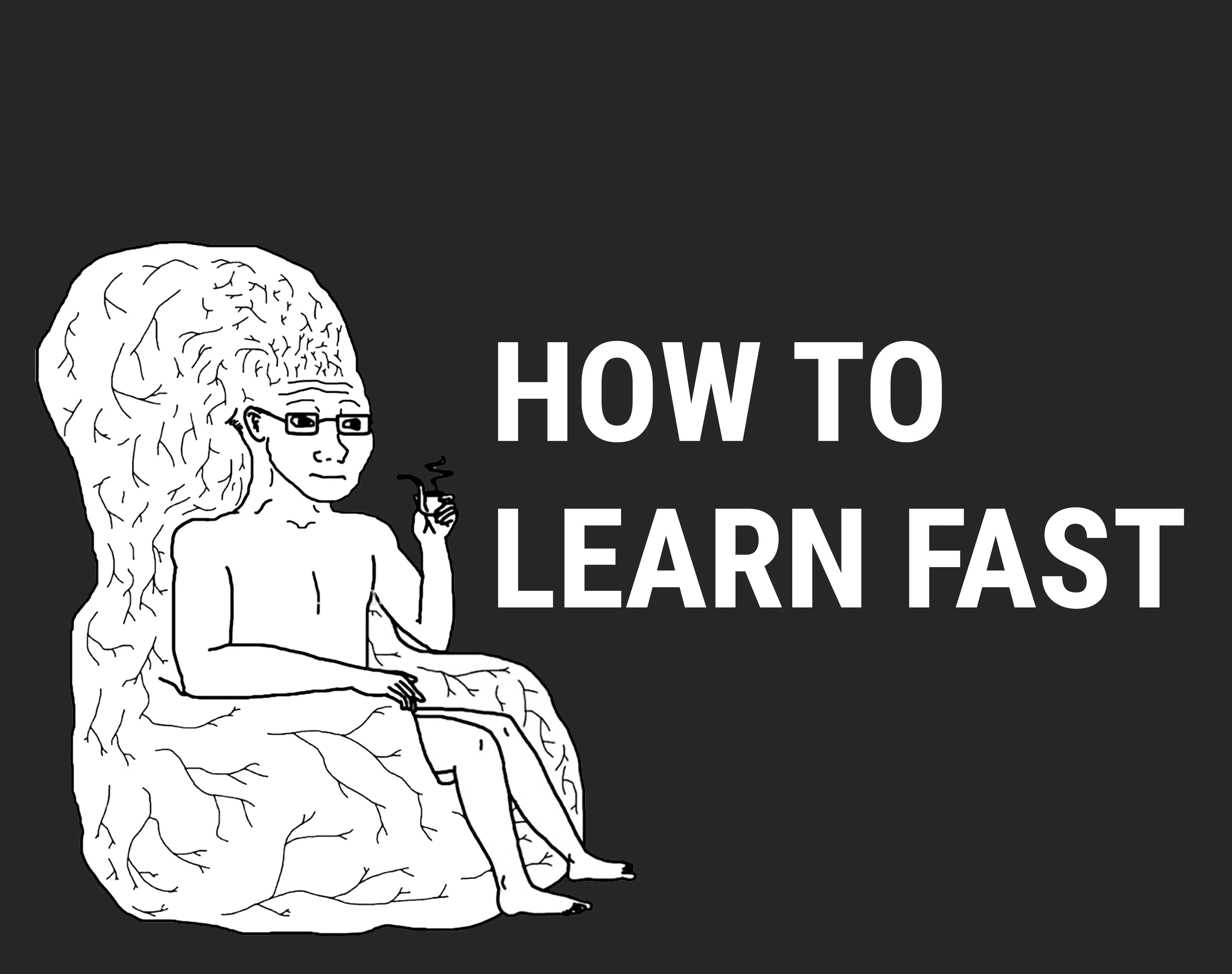How To Learn Fast
9 min read

Whether you're a beginner developer starting from scratch or an intermediate developer seeking to level up, having an efficient learning strategy in place is crucial. Learning a new topic can unlock a realm of possibilities that can significantly impact the trajectory of your journey. In this article, DeGatchi will explain how he managed to optimize his learning as a self-taught developer with no prior experience, eventually becoming a renowned EVM developer.
Intro
Learning is a skill that can be accelerated by using the correct strategies and tactics. The ability to comprehend something quickly and explain it to others without reference helps to move on to the next topic faster.
Exploring an unfamiliar subject is an exciting experience, akin to discovering a cave system with different paths leading to new possibilities. Understanding a concept enables us to identify what is possible and what is not, leading to innovation.
Why should you take advice from me?
I started coding in 2021 with zero prior knowledge. I have since become a highly sought-after developer with expertise in niche topics such as writing and reading bytecode, profitable trading bots, and inventing cutting-edge tools and infrastructure. I am passionate about learning and have even written technical articles explaining some of the most challenging topics in cryptocurrency development, which can be found on my website, https://degatchi.com/articles. Suffice it to say, I am dedicated to the pursuit of knowledge and have studied how to learn effectively, both within and outside the realm of development.
I aspire to share my knowledge with you so that you can enhance your life and achieve your goals as quickly as possible :)
Having said that, lets begin.
1. Purpose
Prior to falling face-first into any rabbit hole learning journey, it is crucial to establish the end goal for learning something. Is the information useful for building a specific feature in a pre-existing product? Is it a pre-requisite to reaching a certain level of comprehension? Or are you aiming to push the boundaries of innovation by comprehending the fundamental concepts and attempting to develop cutting-edge technology?
This purpose is what gives you the hunger, the drive, the burning desire to achieve a goal you’ve set your sights on, the reason for you to get up out of the cosy bed each morning and form discipline around. Without purpose you lack direction, and your hard work becomes consistently inefficient. Therefore, it’s essential to know what you want, envision it, and then start devising strategies and tactics to bring it to life. Without a target, it’s difficult to know what to aim for.
2. Immersion
The more your attention is divided, the longer it takes to absorb information. For instance, if you attempt to learn Rust programming language while also dedicating time to front-end development with Javascript, your mind will be divided. Whatever you choose to focus on will determine what stands out in your everyday life. A great example of this is thinking of a color - if you choose red, you’ll begin to notice it more in your surroundings.
To stay on track, find a community of like-minded individuals. You are the average of those you spend time with. Surround yourself with people with the knowledge of the topic you want to obtain. Join discords, telegrams, any type of group setting that shares the same interests as you. If that’s about reverse engineering, great! Go find a community and be active in it by being curious and engage with people - ask questions, answer other peoples’ questions, spark ideas discussions, etc. Be kind and everything will fall into place.
Another useful tip is to listen to podcasts or read articles while commuting or waiting for something. The more you immerse yourself in the subject, the easier it is to connect the dots. As long as you establish meaningful connections between questions and answers, it will eventually click.
3. Simplify
Nothing is more daunting and demotivating than a complex problem without a step-by-step plan to create a solution. This is often the case when inventing something.
For example, if the grand goal is to comprehend trading bots, what functionality is necessary to build the simplest working version it? (How to build a MEV bot) Only after achieving the first iteration can you continue to expand on it.
Focusing solely on the end goal can lead to burnout since they often require a significant amount of time to achieve. We need some motivation to reward us when working towards the final objective. Therefore, it’s essential to create small, achievable goals that move us closer to the light. Each small accomplishment is a dopamine hit, reinforcing us to complete another task and another, leading to our ultimate goal in no time. As we progress, the journey becomes the primary focus.
4. Be Pragmatic
Experience is the best teacher. Would you rather learn from someone who has been experimenting and making mistakes for three years, or someone who has been studying theory for the same period? Obviously, the latter, right? However, in all seriousness, being an expert in theory only goes so far. Imagine having to build a complex program entirely from scratch without any prior experience in building these types of systems. Theory helps you design implementations, but you cannot build it without actually building it, testing if things work, etc.
When you practice something you connect the dots of the theory you’ve learned but don’t understand
the why or how - this is why they give you problems to solve in class after you learn about a topic.
You’re forced to solve the why/how problem and then always knowing why because you’ve reenforced
that learning with actual solutions with a goal. If you want to build a program that does x task.
Simplify the task, start at what is required to make the first iteration and do it until you hit a
wall. Then solve that blocking problem and the cycle continues until you reach the end.
5. Consistency
If you’re anything like me, you may find yourself jumping from topic to topic. However, if you want to excel at something quickly, you need to concentrate. It’s better to devote a few hours of intense focus to something than to be distracted and unintentional in your learning, such as watching YouTube videos simultaneously. You need to establish a long-term goal and small achievable goals that provide a dopamine boost when you achieve them. This is how humans maintain consistency. Without this reward mechanism in our brains, we wouldn’t stick with anything for an extended period based on willpower alone. Doing something you hate won’t work because it doesn’t provide the satisfaction of achieving goals.
Personally, I aim to make progress every day, no matter how small. Over time, these small accomplishments build upon one another, eventually leading me to where I want to be. When you concentrate on the small goals, there is constant change, which is very appealing to me. New challenges to solve, new topics to learn, all in the same field but slightly different. You need to fall in love with the journey; otherwise, it becomes an artificial task that you force yourself to do.
The objective is to optimize learning. The more you do something, the more your mind thinks about it. For example, when I’m stuck on a challenging problem for a day, I think about it before going to sleep, so my mind can rest but also process it subconsciously. More often than not, in the morning, I figure out a solution.
It’s also crucial to take breaks! Even though you may feel like you need to keep working, remember that taking a break is beneficial since it allows you to reset and clear your mind. Take frequent breaks during the day to refresh your mind when feeling overwhelmed, such as walks outside in the sunlight or around the house, and take a break for a day once in a while, similar to taking a rest day at the gym to allow your muscles to recover. Your brain can only tolerate so much before your processing power begins to deteriorate.
inally, make sure you get adequate sleep, never neglecting this. It’s the only way we can repair our bodies. Without proper quality sleep, we won’t be at our peak performance to learn and function. Take care of yourself anon.
Bonus: Flow State
The flow state typically begins after approximately 20 minutes of focused attention, during which we operate at our peak performance. Unfortunately, distractions can easily break this state, forcing us to start the process again. As you may know, attention is the most valuable commodity in this age. With the prevalence of social media, drama, notifications, and other distractions, our attention is constantly being sought after. Therefore, we must focus our attention on our tasks rather than mindless distractions that do not help us in life. We can optimize our environment for this by putting our phones in a different room, clearing our desk so that only necessary items are present, having a notepad to visualize our thoughts, and either listening to music or not. I’m a bit weird and get into a flow state when I blast music with lyrics, and perhaps that works for you as well. The goal is to try to work for as long as possible without breaking our flow state. This can also be interrupted by getting up to go to the toilet, get food, etc. The flow state is incredibly powerful, and if we can optimize for its recurrence, we can achieve significant results in short periods of time (imagine a year of daily flow state work).
Final
I hope this knowledge serves you well, and you are able to take something valuable from it. If the techniques don’t work for you initially, don’t give up. Keep trying or experiment with your own methods. The objective is to commit to something you want to achieve, stick to it for a significant amount of time, and strategically devise how to tackle each obstacle that you will undoubtedly face.
If you found this information useful, please share it with anyone you believe may benefit from it. It’s always wonderful to spread positivity and help each other out. Who knows, perhaps you’ll make a friend by sharing it :)
Good luck with your aspirations, anon. I’m sure you’ll do great things in this life!
Share this Article
Recent Articles
-

Overcoming Mental Warfare
When does pain stop? This constant back and forth of two titans colliding conscious never seens to let up...Will I ever escape? I must confront them, even if it means I will lose myself in the process. Fear not death but to live a life with undecisiveness.
-

Numbing Persistance
There is nothing you can do but endure and persist to grasp those dreams from many moons ago. It feels mind numbing, all this effort. Maybe one day you'll reach it but at what cost? Was it worth it? All that pain and suffering, for what cause? Are you fighting to survive or is this thought play for you? For me, it's survival. Without it I would have nothing, but to rot in my mind as time drifts by.
-

A Warrior's Journey
Deciding to become who you want to be is no easy feat. You are destined to battle the strongest of enemies on that path, sometimes with friends but majority of the time alone. What does the mind of one that is walking this path for the second time look like?
